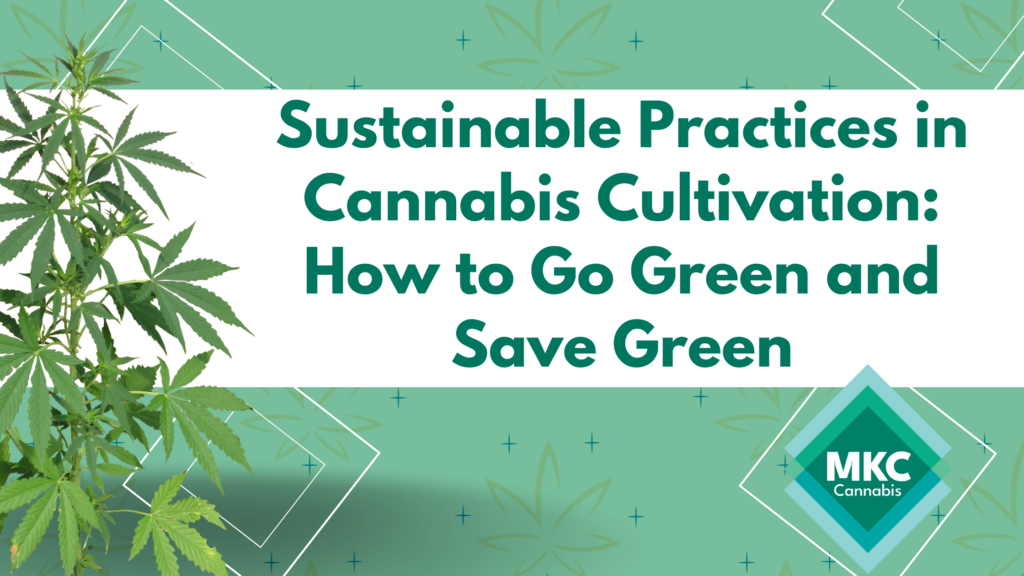The cannabis industry is booming, but with growth comes responsibility. As demand increases, so does the environmental impact of cannabis cultivation—high water consumption, excessive energy use, and waste production are just some of the challenges. However, sustainability isn’t just good for the planet; it’s also good for business.
By implementing eco-friendly practices, cannabis cultivators can reduce costs, improve efficiency, and attract environmentally conscious consumers. In this blog, we’ll explore the best sustainable practices in cannabis cultivation and how they can help businesses save money while minimizing environmental impact.
1. Energy Efficiency: Cutting Costs and Reducing Carbon Footprint
Why It Matters:
Indoor cannabis cultivation requires high energy consumption, mainly for lighting, climate control, and ventilation. According to the Lawrence Berkeley National Laboratory, indoor cannabis production accounts for 1% of total U.S. electricity use, costing billions annually.
Sustainable Solutions:
🔋 LED Lighting – Replacing traditional HPS (high-pressure sodium) lights with LED grow lights reduces energy consumption by up to 50%, cutting electricity costs significantly.
🌞 Solar Power Integration – Installing solar panels can lower dependence on grid electricity, reducing long-term energy expenses.
🌬 Energy-Efficient HVAC Systems – Smart climate control and automated ventilation systems optimize energy use, preventing unnecessary heating or cooling.
✅ Cost Savings Example: Some cultivators report savings of 30-50% on electricity bills after switching to LED lighting and upgrading climate control systems.
2. Water Conservation: Reducing Waste and Improving Efficiency
Why It Matters:
Cannabis is a water-intensive crop, with some estimates suggesting one cannabis plant can consume up to six gallons of water per day. Overuse leads to water shortages, high utility bills, and environmental stress.
Sustainable Solutions:
💧 Drip Irrigation Systems – Deliver water directly to the plant’s root zone, reducing waste by up to 70% compared to traditional irrigation.
🚰 Rainwater Collection & Recycling – Capturing and filtering rainwater for irrigation helps reduce reliance on municipal water sources.
🌱 Drought-Resistant Strains – Choosing hardier strains that require less water can improve efficiency, especially in dry climates.
✅ Cost Savings Example: Growers using drip irrigation systems have reported 40% reductions in water usage, leading to substantial savings on water bills.
3. Soil Health & Organic Cultivation: Eliminating Chemical Waste
Why It Matters:
Conventional cannabis farming often relies on synthetic fertilizers and pesticides, which can degrade soil quality and contribute to pollution. Sustainable soil management practices create healthier plants while reducing reliance on chemical inputs.
Sustainable Solutions:
🌿 Living Soil Cultivation – Using organic compost and beneficial microbes enhances soil health and nutrient absorption, reducing the need for synthetic fertilizers.
🐞 Integrated Pest Management (IPM) – Replacing chemical pesticides with natural predators like ladybugs and companion planting minimizes harmful runoff.
🔄 Crop Rotation & Cover Crops – Prevents soil depletion, maintains biodiversity, and reduces erosion.
✅ Cost Savings Example: Cultivators switching to living soil and organic compost have reduced fertilizer costs by up to 30-50%.
4. Sustainable Packaging: Reducing Waste and Meeting Consumer Demand
Why It Matters:
The cannabis industry generates millions of pounds of packaging waste each year, much of it single-use plastic. Consumers are becoming increasingly aware of environmental concerns, and eco-friendly packaging is a competitive advantage.
Sustainable Solutions:
♻ Biodegradable & Recyclable Packaging – Switching to materials like hemp-based plastics, compostable pouches, and glass containers reduces environmental impact.
🌍 Minimalist Design – Reducing packaging size and eliminating unnecessary materials lowers costs and waste production.
🔁 Reusable Packaging & Take-Back Programs – Offering refillable containers or recycling incentives encourages sustainability and builds brand loyalty.
✅ Cost Savings Example: Some dispensaries implementing refillable glass jar programs have seen packaging costs drop by 20-30%, while also improving customer retention.
5. Waste Reduction: Turning Cannabis Byproducts into Revenue Streams
Why It Matters:
Cannabis cultivation produces a significant amount of organic waste, including stems, leaves, and unused plant material. Instead of disposing of it, businesses can find innovative ways to reuse and repurpose waste.
Sustainable Solutions:
🌾 Composting Cannabis Waste – Converting plant waste into natural fertilizer enriches soil and reduces landfill contributions.
🛢 Biofuel Production – Some cannabis byproducts can be used to create biodegradable plastics or biofuels, turning waste into valuable resources.
🧴 Secondary Product Development – Extracting cannabinoids from trim and stems for CBD oils, tinctures, or pet products creates additional revenue streams.
✅ Cost Savings Example: Growers who compost their plant waste save thousands in waste disposal fees while improving soil health.
6. Sustainable Business Practices: Gaining a Competitive Edge
Why It Matters:
Going green isn’t just about reducing costs—it’s about building a sustainable brand that resonates with modern consumers. Studies show that 75% of cannabis consumers prefer eco-friendly brands, meaning sustainability can be a strong marketing differentiator.
How to Leverage Sustainability in Branding:
🌱 Certifications & Transparency – Display organic, fair-trade, or sustainability certifications to build credibility.
📢 Storytelling & Education – Share how your business is reducing environmental impact through blogs, social media, and packaging.
🌍 Community Involvement – Partner with eco-friendly initiatives or host sustainability events to strengthen brand loyalty.
Example: Companies like New Naturals Distribution emphasize their organic growing methods and biodegradable packaging to attract sustainability-minded consumers.
A Win-Win for the Planet & Your Bottom Line
Sustainability in cannabis cultivation isn’t just about being environmentally responsible—it’s a smart business move. By adopting eco-friendly practices, businesses can lower operational costs, meet consumer demand, and build long-term profitability.
Ready to elevate your brand with sustainable practices?
Explore MKC Cannabis’s Brand Guide for expert insighcts on eco-friendly branding, or check out our portfolio to see how we help cannabis businesses grow sustainably.







